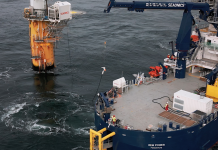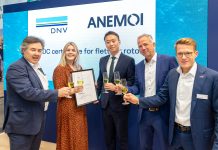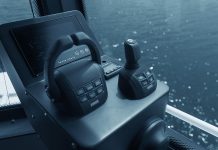A leading supplier of rotor blades for wind turbines, LM Wind Power, has announced the launch of an innovative research project to develop blades with flexible tip lengths. The four year project is supported by the Dutch Ministry of Economic Affairs and brings together a consortium of partners that includes the Dutch University of Twente and the research institute, Energy Research Centre of the Netherlands (ECN).
LM Wind Power is leading a consortium that will develop a cost effective, flexible blade length concept with the potential to reduce cost of energy by 8-10 percent. This project addresses the untapped potential of optimizing individual wind turbines to their maximum performance by extending the rotor diameter with variable tip lengths.
Energy output of a wind turbine depends on its location in the wind farm as they are subject to different wind conditions, often due to wake effects. Many of the wind turbines running today are not loaded to their full capacity as typically the turbines installed are of similar design regardless of the position in the array. This project seeks to change that.
“The cost of wind power, especially offshore wind power, needs to go down to compete with other energy sources and we are committed to making that happen,” said LM Wind Power’s VP of engineering, Roel W. Schuring. He continued: “This project with our Dutch partners, aims to help wind farm developers and wind turbine manufacturers to design wind farms better and to get the most from each turbine. This will improve annual energy production (AEP) and reduce cost of energy. The potential is huge.”
The project looks at design, material, manufacturing, and assembly processes to achieve the most flexible and cost efficient solution. The concept is based on a standard basic blade part with variable tip lengths. It builds on an existing lightweight composite blade design, but innovates by using an assembly process, which leads to a permanent assembly of the two blade parts, adding minimal weight. The result is a larger rotor that increases annual energy production significantly for a relatively small investment.
The flexible tips are expected to be manufactured separately, which enables the use of specific techniques and a one-shot manufacturing technology while providing economies of scale. Assembly is expected to be done on or near site. The consortium points to offshore as the area that will benefit most from the method as the improved performance from the blade length optimization will see a quicker pay back at sea. The new rotor blade will also be a universal solution that can be adapted to various turbines and applied in every wind farm.
The four-year project is co-funded by the Dutch Ministry of Economic Affairs.



























